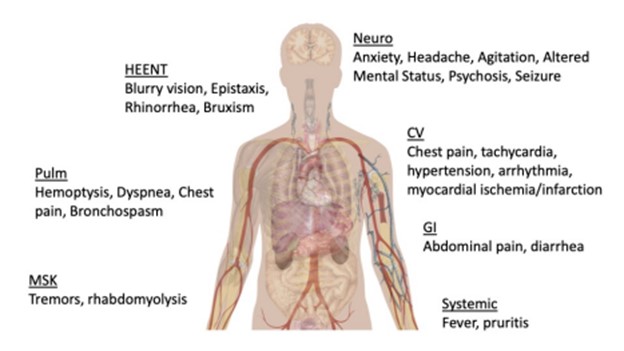A nurse is assessing a client who is experiencing acute cocaine toxicity. Which of the following findings should the nurse expect?
Hypothermia
Hypotension
Tremors
Respiratory depression
The Correct Answer is C
Tremors: This choice is correct. Tremors or muscle twitching can be expected in a client experiencing acute cocaine toxicity. Cocaine is a central nervous system stimulant that can cause overstimulation of muscles, resulting in tremors.
Incorrect:
A- Hypothermia: This choice is incorrect. Acute cocaine toxicity is associated with an increase in body temperature (hyperthermia) rather than a decrease (hypothermia). Cocaine is a stimulant that can cause the body to overheat, leading to hyperthermia, which is a dangerous condition that requires immediate medical attention.
B- Hypotension: This choice is incorrect. Cocaine is a stimulant that increases blood pressure and heart rate, leading to hypertension (high blood pressure), not hypotension (low blood pressure). Hypertension is a common cardiovascular effect of cocaine use.
D- Respiratory depression: This choice is incorrect. Respiratory depression, which is a slowing of the respiratory rate and depth, is more commonly associated with depressant drugs like opioids or benzodiazepines. As a stimulant, cocaine tends to have the opposite effect, leading to increased respiratory rate (tachypnea) and sometimes hyperventilation.

Nursing Test Bank
Naxlex Comprehensive Predictor Exams
Related Questions
Correct Answer is D
Explanation
A. While choice A, “I haven’t gotten my period yet, and all my friends have theirs,” is a valid concern for a 13-year-old, it is generally a normal part of development. Menarche can occur anywhere between ages 9 and 16, so it’s not uncommon for some girls to start later than their peers. However, it is important to address this concern and provide reassurance.
B- "My parents treat me like a baby sometimes." This comment suggests a possible issue with parent-child dynamics, but it does not indicate an immediate health concern. The nurse may explore this further during a counseling session or refer the adolescent to a school counselor if necessary.
C- "There's a big pimple on my face, and I worry that everyone will notice it." While acne can impact an adolescent's self-esteem, it is not a priority issue from a health perspective. The nurse can provide support, discuss basic skincare practices, and offer guidance on managing acne if appropriate.
D. "None of the kids at this school like me, and I don't like them either." This comment indicates potential issues with social relationships, isolation, and possible mental health concerns, which should be prioritized for further evaluation and support. The client might be at risk for depression, an eating disorder or self-harm.
Correct Answer is C
Explanation
Obtaining informed consent is a crucial step before administering electroconvulsive therapy (ECT). Informed consent ensures that the client is fully informed about the procedure, its potential risks and benefits, and any alternative treatments available. It allows the client to make an autonomous decision regarding their treatment.
The other responses are not accurate:
A- "ECT is an effective treatment for personality disorders." While ECT may be used in certain cases of severe mental illness, it is not primarily indicated for personality disorders.
B- "It is a myth that clients experience seizures during ECT." Seizures are a common and expected effect of ECT. ECT involves the induction of controlled seizures under anesthesia.
D- "Should monitor the client closely for hypotension following ECT." While monitoring the client for various physiological changes is important, hypotension is not a primary concern following ECT. The nurse would typically monitor for potential adverse effects such as confusion, memory loss, headache, and muscle soreness.
Whether you are a student looking to ace your exams or a practicing nurse seeking to enhance your expertise , our nursing education contents will empower you with the confidence and competence to make a difference in the lives of patients and become a respected leader in the healthcare field.
Visit Naxlex, invest in your future and unlock endless possibilities with our unparalleled nursing education contents today
Report Wrong Answer on the Current Question
Do you disagree with the answer? If yes, what is your expected answer? Explain.
Kindly be descriptive with the issue you are facing.
